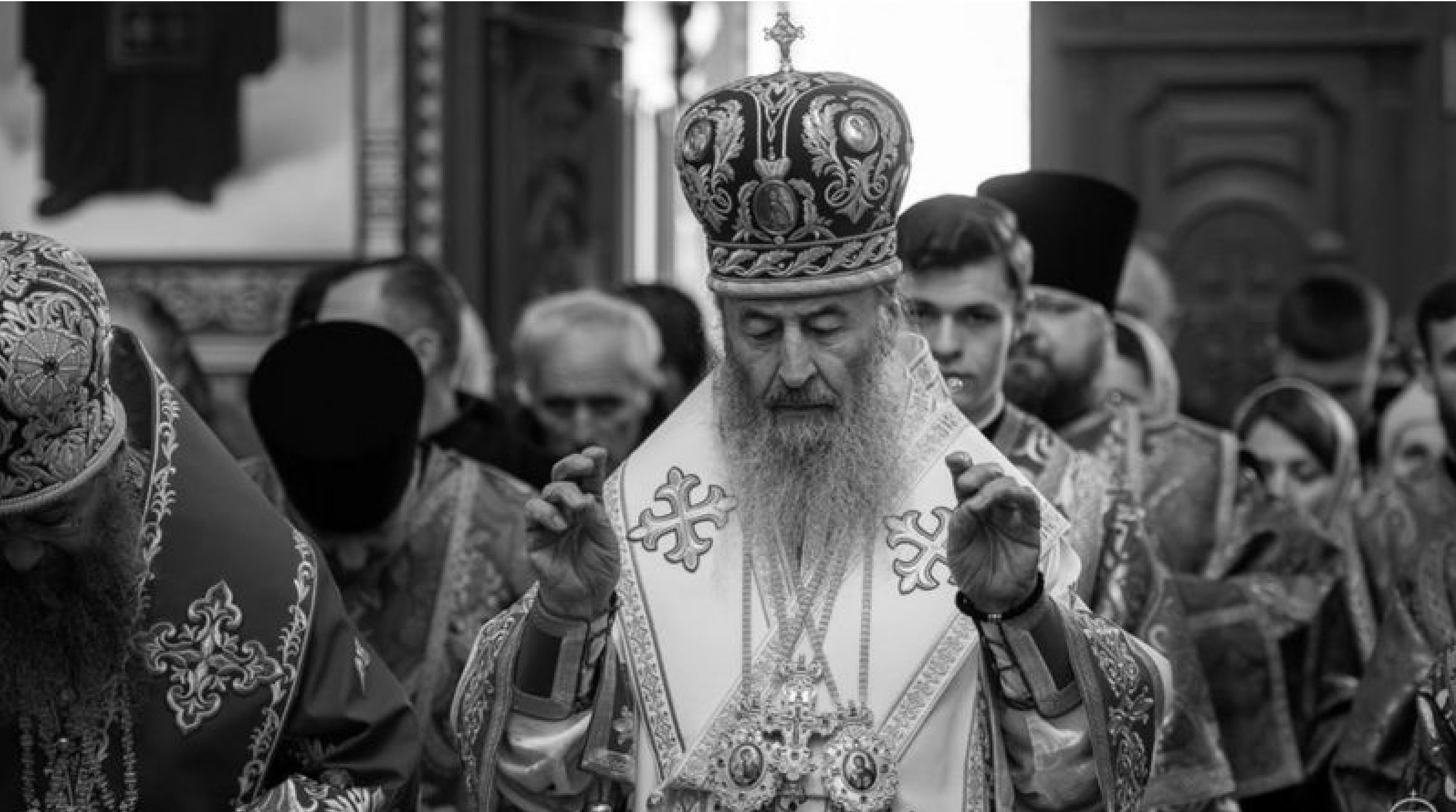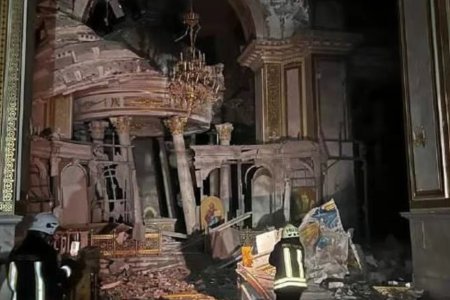
On 19 October, Ukrainian legislators passed in its first reading a bill, tabled by the government and envisaging a ban on religious organizations with links to Russia as the aggressor state. While there is considerable support in Ukrainian society for such a ban, some analysts, such as Dmytro Vovk, Head of the Research Centre on Rule of Law and Religion,, believe that such a ban is disproportionate. In a recent interview to KHPG, he suggested that any such law would be ineffective, and would likely create problems, rather than eliminate them.
Draft law No. 8371 proposes amendments to legislation, mainly, although not only, Ukraine’s Law on Freedom of Conscience and Religious Organizations. The latter’s Article 5, for example, would be amended to include the following: “The activities are prohibited of religious organizations which are affiliated with centres of influence of religious organizations (associations) whose management is outside Ukraine in a country which is waging armed aggression against Ukraine.” Although the draft law does not name names, the particular church in question is called the Ukrainian Orthodox Church [UOC] and was, at least until early 2022, linked with the Moscow Patriarchate. Although there was a reasonably large majority who voted for the bill on 19 October, the bill itself had been tabled at the beginning of the year. It is, seemingly, the mildest of at least three bills originally drafted, with one having proposed the immediate ban on UOC and another also envisaging stripping the Church of all property, as well as simplifying the transfer of congregations to the Orthodox Church of Ukraine.
The bill is strongly opposed by UOC which claims that it has no ties with Russia and says that in the spring of 2022 it introduced amendments to its charter, distancing itself from the Russian Orthodox Church. In fact, UOC spokesperson Mykola Danylevych told Radio Svoboda that there was no mention of any affiliation with Russian religious organizations in any of its legal and canonical documents.
This is not the opinion of Ukraine’s State Service on Ethnic Policy and Freedom of Conscience which asserts that UOC remains affiliated, and that the two churches are not canonically separated. Viktor Yelensky, Head of the State Service, also spoke with Radio Svoboda, saying that the draft bill is aimed at putting an end to the influence wielded by the Moscow Patriarchate. The latter “is not just not an inspirer of Russia’s aggression against Ukraine, but also a fully-fledged participant” Yelensky asserts that UOC leaders know what is needed to fully break with the Moscow Patriarchate, but have yet to do so.
The majority of Ukrainians also see UOC as linked with the church in Russia. A survey carried out in May – June 2023 by the authoritative Kyiv International Institute of Sociology reported that, according to the poll they had conducted, a massive two thirds (66%) of respondents believed that UOC (of the Moscow Patriarchate) should be banned. This was 12% more than in the same survey in December 2022. The questions asked did, of course, mention apparent subordination to the Moscow Patriarchate which UOC maintains that it no longer has.
The link to the Moscow Patriarchate was entirely open until after Russia’s full-scale invasion of Ukraine, and from 2014 UOC (MP) was increasingly isolated from other religious confessions in Ukraine in terms of its attitude to Russia’s aggression. While officially condemning all violence in Donbas, it did not take a stand condemning the aggressors, and at least individual priests were believed to have supported the Russian fake ‘republics’. In occupied Donbas and Crimea, all faiths except the church linked with the Moscow Patriarchate came under attack immediately. Since Russia’s full-scale invasion of Ukraine, Russian patriarch Kirill (Gundyaev) and his Russian church have dropped any pretence and are openly supporting Russia’s aggression (see here and here).
Dmytro Vovk believes that the draft bill is first and foremost a response to the demand for action from the Ukrainian public, including those who are not religious. This is not only because of specific cases of collaboration, but also because of the less than clear reaction to Russian aggression from UOC and its leaders, especially before the full-scale invasion. This, he says, is why President Volodymyr Zelensky promised such a response and, on the basis of a decision from the National Security and Defence Council, he got the Cabinet of Ministers to draw up the relevant draft bill.
Vovk suggests that the debate itself has become quite politicized with emotions understandably high, given the ongoing war. He cites the case of an MP who was asked why he wanted to ban an entire faith when there have, to date, only been 68 prosecutions among UOC priests for collaborating with the aggressor state. The MP suggested that, if the law was passed, they would get 60-90 thousand in one oblast alone. This, Vovk points out, is a serious misunderstanding of the situation, with the MP’s claim especially off-track since there are only just over 10 thousand UOC priests in the entire country.
Vovk’s warnings about this bill and any attempt to ban a whole faith are sobering. Asked whether it is possible to ban UOC and how this would take place, he said that questions must arise as to whether it is proportionate to impose a blanket ban and not just a specific religious community or organization if that were found to have supported the Russian military or helped Russia attack Ukrainian positions.
Ukraine’s Security Service say that 68 criminal prosecutions have been initiated, with slightly less than a third having been passed to the court. There have been some sentences passed against UOC priests for collaborating with the aggressor state, with at least two cases where priests convicted of collaboration were, despite being Ukrainian nationals (but doubtless with their consent), exchanged for Ukrainian prisoners of war.
Any such case of collaboration is shocking, however these statistics still make up only a tiny percentage of the 10 thousand or so UOC congregations and an equivalent number of priests. Nor can a legal ban on the organization have any impact on priests or members of the church who have collaborated. Any collaboration should prompt criminal proceedings, with the latter having nothing to do with the Law on Freedom of Conscience, whether or not the proposed amendments on a ban are adopted.
The public debate has gone beyond discussing issues of choice between religious freedom and national security, Vovk says and have turned to issues of identity. The question for many is how a church can be allowed to exist in Ukraine that has or at least until recently had such close ties with the Russian Orthodox Church which is supporting and ‘blessing’ Russia’s war of aggression against Ukraine. The problem here, however, is that there are many UOC priests who have an actively pro-Ukrainian position, support Ukrainian defenders, help people forced from their homes or in need because of the war.
A full ban, Vovk asserts, would be an inadequate response and one that is ineffective. “State policy needs to be better considered and balanced.”
It is quite possible that the legislators who voted for the bill in its first reading are not clear for what they did not, in fact, vote. Churches in Ukraine, Vovk stresses, do not form single legal entities. The Ukrainian Orthodox Church is a huge mass of legal bodies, with each congregation, monastery or seminary constituting a separate entity. In each case according to the draft law now proposed, there would initially be an order that they remove ties with Russia and then, if they didn’t, the authorities could turn to the courts asking for their registration as religious organizations to be removed. Such a ban, however, would only apply to the specific legal entity.
Judging by the UOC spokesperson’s position, it is also possible that in each of the cases, it could be difficult to find formal acknowledgement or proof of such links.
There are issues also with respect to international law and response from Ukraine’s international partners. Vovk points out that international standards view bans on any religious organization as a final resort used only where other measures have failed. If a specific congregation had taken part in collaboration, that would be grounds for prosecuting the individuals who had taken part and banning the specific congregation. It would not constitute justification for banning the entire religious faith (in this case, UOC).
Vovk is convinced that it would simply not be possible to prove that all congregations were implicated in such collaboration, and any attempt to prove that a significant percentage of the UOC leadership were supporting Russia, this would need to be made public, with court proceedings, etc. Without that, Vovk is convinced, there can be no grounds for a total ban. He warns that, if the bill is passed in its present form, it will be subjected to international criticism. He advises parliament to ask authoritative European or international institutions, like the Council of Europe’s Venice Commission, to provide their assessment of the bill. That, he explains, would significantly increase the legitimacy of any adopted law.



